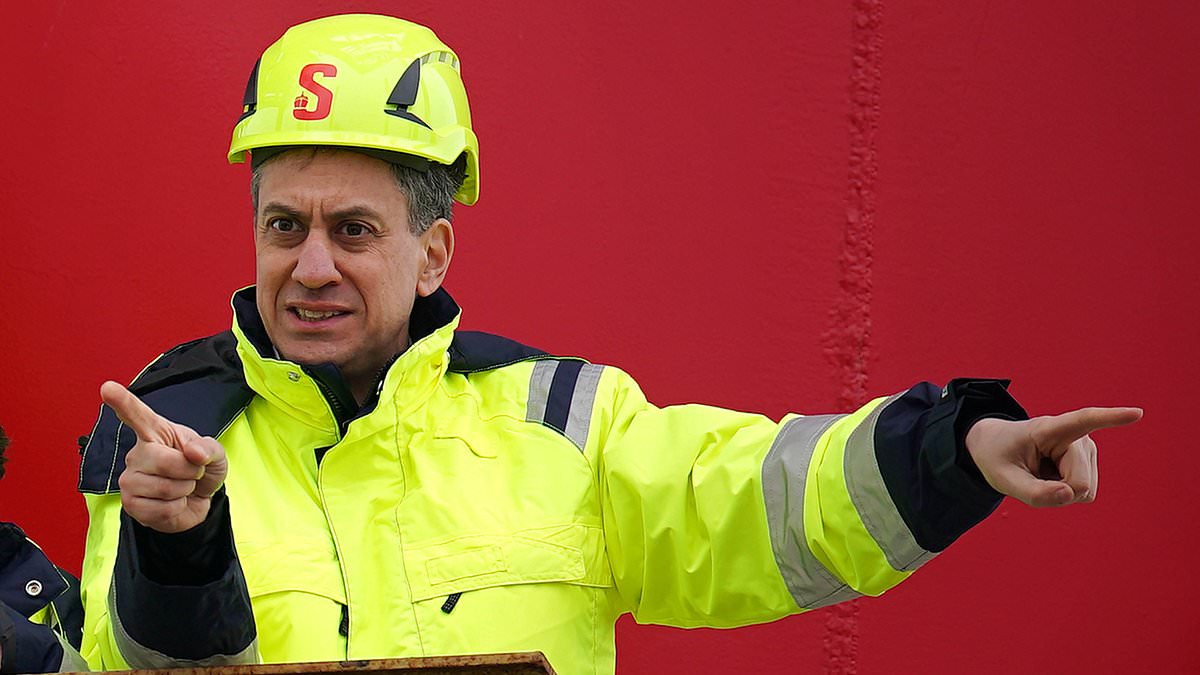Just one in six energy bosses think the world can achieve Net Zero by 2050 — down from nearly half of executives interviewed last year.
The stark fall in confidence — which was revealed in a global survey for the energy sector — sparked calls for ministers to slash regulation, provide more financial incentives and reform Britain’s planning system.
Polling from the Energy Industry Council came as Sir Keir Starmer appeared to soften his stance on Net Zero, suggesting oil and gas would be part of the UK’s energy future for ‘decades’.
The Prime Minister’s comments are a blow to Energy Secretary Ed Miliband, who has championed the country’s transition to clean energy with the creation of GB Energy at an initial cost of £8.3billion.
Andrew Bowie MP, Acting Shadow Energy Secretary, said: ‘Labour’s reckless energy policies have shattered industry confidence. When nearly half of senior energy executives lose faith in the government’s energy policy isn’t working.
‘Setting arbitrary targets with no real plan leaves us weaker. Instead of backing British industry, Labour throws billions at Ed Miliband’s GB Energy vanity project, lets eco-zealot donors dictate policy, and flirts with handing our energy security to China. Meanwhile, businesses that should be leading the transition are losing faith, and bills keep rising.’
The EIC survey shows that just 16 per cent of senior energy executives believe the world can achieve net zero by 2050, down from 45 per cent when they were asked in 2024.
The industry figures, most of whom are UK-based, pointed to a lack of policy clarity, underinvestment and delays in getting projects underway as the reasons for the fall in conviction.
They appear to say ministers are failing to hit short-term targets as well.
Only 14 per cent feel their countries can achieve interim targets that need to be hit by 2030, down from 16 per cent last year.
When asked about the global picture, 5 per cent believe interim targets will be met worldwide, compared to 11 per cent a year ago.
The EIC’s report states: ‘This is more than a perceptual shift; it’s underpinned by systemic barriers, policy inertia and flip-flopping.
‘This dissonance raises an important question about governments’ roles in effectively incentivising and pressuring all parties to take appropriate actions to meet net-zero targets.
‘It highlights lapses in government leadership, particularly linked to the erratic nature of energy security, net-zero, and trade policy setting, as well as the lack of binding mandates and regulations needed to drive faster implementation that current costs allow (using the stick, not just the carrot).’
Energy bosses say that while the private sector is willing to invest, the absence of long-term, stable policies creates financial risk.
Stuart Broadley, EIC chief executive, said: ‘Business leaders are not seeing the level of policy certainty or investment required to deliver net-zero ambitions.
‘In the UK, if the government is serious about achieving its interim targets, it needs to listen closely to what the supply chain is saying. The message isn’t a very happy one. We need a lot of immediate reforms that speed up licensing processing and cut other red tape, ensure consistent policy and regulation, have the right financial incentives.’
‘The data leaves no room for optimism-confidence in net-zero targets is collapsing across the energy sector,” Mahmoud Habboush, author of the Net Zero Jeopardy II report, added.
‘These barriers, if left without tackling, will no doubt derail the energy transition.’
Andrew Montford, Director of the Net Zero Watch campaign, said last night: ‘This is no surprise. It has been obvious for several years that Net Zero is irrational and unaffordable.
‘It is no longer a question of whether Net Zero will fail, but of when, and how much damage will be done to the country before the inevitable reversal takes place.’
Yesterday, Sir Keir appeared to soften Labour’s Net Zero rhetoric as he pledged £200million for the Grangemouth oil refinery.
Speaking in Glasgow yesterday, the PM said: ‘Scotland will lead the way, but you cannot come at this issue with simple principles divorced from the practicalities. Now this is a transition that must be managed pragmatically. Clean energy is a vital part of energy security. It strengthens our national security.
‘It gets Putin’s boots off our throat. But equally the oil and gas in our waters, it’s also vital for our security. So I repeat, oil and gas will be part of the future of Scotland for decades to come. Decades.’
A spokesman for the Department of Energy, Security and Net Zero said: ‘Net Zero is the economic opportunity of the twenty-first century, and will deliver good jobs, economic growth and energy security.
‘Britain is back in the business of climate leadership because the only way to protect current and future generations is by becoming a clean energy superpower and leading global climate action.
‘We are also working closely with industry to build the supply chains needed to support a new era of clean homegrown power, securing greater energy independence and bringing jobs and wealth to every corner of Britain.’
